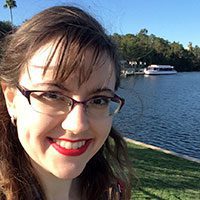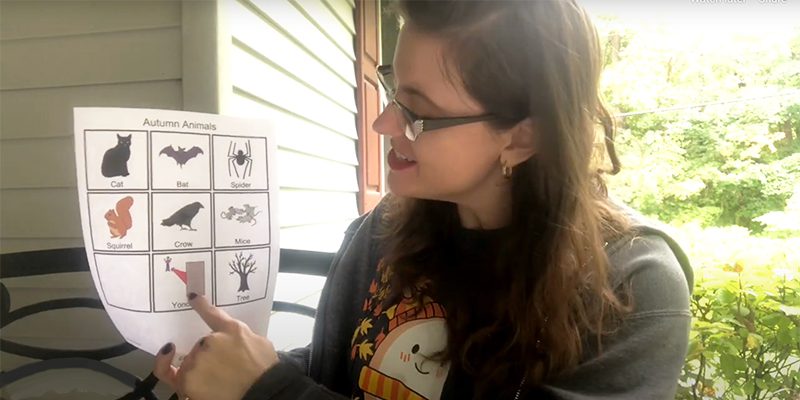By Children’s Librarian Shelley Harris
October is a big month! Many kids are excited for Halloween, of course. We finally enter an autumn that will last a while; that’s usually pretty great. Sometimes we even see a few snow flurries, which is probably more exciting to me than to others.
And of course, every year, Jenny and I love to celebrate Augmentative/Alternative Communication (AAC), Down Syndrome, and ADHD Awareness Months! These are all important to us because of our loved ones who use AAC, have Down Syndrome, and have ADHD. Which now includes me! I was diagnosed with ADHD this year, after a lifetime of misconceptions and misunderstandings.
We talk a lot about disabled kids at the library and in these posts, but I know there are also disabled parents and caregivers, and we want to support you, as well.
In November, I’ll be presenting on Understanding Autism and ADHD, with the goal of helping family members understand or explain neurodivergence. My hope is that extended family who don’t often interact with their autistic or ADHD family members will feel ready to set visits up for success and that neurodivergent people will have words and resources to use to explain their brains and what they need for success.
Watch these videos
Let’s look at videos that can be used with kids to validate themselves or introduce new topics.
Disabilities are not a bad thing or a good thing. They are just a normal thing, a normal part of many people’s lives. This video offers an introduction to what a disability is and what we can do with our curiosity about new things. If you’d like to find more books about kids with disabilities, mostly written by disabled authors, check out our Disability Reads bibliography.
We Move Together is another great book that normalizes disabilities and introduces the concepts of disability justice and disability community. The (disabled) creators put together a phenomenal reading guide with discussion points and activities, including a scavenger hunt through the book.
Autumn is the perfect time to go outside and play–there’s so much scope for the imagination in the falling leaves and beautiful colors. Grab your AAC and let’s describe the things we see using all of our senses!
Read these books
For kids
There have been some wonderful new books published recently.
- A Day With No Words by Tiffany Hammond is told from the perspective of a Black child who uses AAC, on a day when his mom is also using AAC. There are plenty of words, just none spoken by mouth! The author is both autistic and the mother of autistic boys.
- I Talk in Different Ways by Amanda Hartmann is a great read about all of the different ways we all use to communicate, every day. Waving, texting, emojis—these are all great and valid ways to share our thoughts.
- Wiggles, Stomps, and Squeezes Calm My Jitters Down by Lindsay Rowe Parker shows a great caregiver role model who helps this kid with their sensory diet and when things get too overwhelming. I just made a video about this book, which I think is great for kids who need support when the jitters inside start to be too much. If tapping, stomping, or running helps them self-regulate, then tapping, stomping, or running is fantastic. The author is neurodivergent and understands what busy bodies and busy brains feel like.
There are still a lot of books that need to be written, though. There weren’t any books published about kids with Down Syndrome, for example, and just these few about AAC users or kids with ADHD. That’s a lot of kids who aren’t seeing themselves in books and stories!
For adults
Recently, Sam Houston State University put out a bibliography about parenting with a disability or chronic illness, which is a great resource for disabled or ill caregivers. But you’re going to notice that a lot of the books are 10, 15, or even 20 years old.
Here are two new titles from their lists that you can borrow with your Oak Park library card:
- Disability Visibility by Alice Wong
- We’ve Got This: Essays by Disabled Parents by Eliza Hull
Explore these resources from around the internet
- Swingset Mamas share music on Facebook, using AAC on screen.
- Joe is a speech therapist who has fun songs and activities with AAC. I especially love Slow and Fast!
- Amanda Hartmann has book and activity videos with AAC. Pranking Dad is a classic!
- Have you ever seen Lost Voice Guy perform standup comedy with his AAC device? He’s hilarious. He also talks about the importance of having a voice that matches your family and community.
- When it comes to ADHD, I grew up with a lot of misconceptions—especially the idea that boys who moved around a lot were the only ones who could have ADHD. Em Hammond of NeuroWild has helped me understand ADHD and myself so much more! She’s an autistic and ADHD speech therapist and artist who explains things so beautifully. Check out her art on Facebook, Instagram, or Teachers Pay Teachers.
- ADDitude magazine also has great information and posts, from people with ADHD. This one on hyperfocus (the opposite of the distractable stereotype!) made me feel very seen. It’s not disobedience or being lazy: our brains do things differently, and we need to learn ways to work with it.
- Actually ADHD’s purpose statement is, “Empowering ADHDers through community, understanding, encouragement, practical advice, and accurate information,” and that’s pretty great.
- Do you struggle with keeping your life balanced? How to Keep House While Drowning is written by a neurodivergent person especially for other neurodivergent people (autism, ADHD, OCD, etc.), and is a great way to reframe your thoughts. Get stuff done while working with your brain and not against it.
Sometimes things feel really hard. But you have a community of caregivers and librarians who have your back. Let me know if there are topics you’d like to see explored or resources you’d like to see more of.

About Shelley
Shelley is a children’s librarian with a passion for early literacy, serving and celebrating the disability community, and exploring technology. She can often be found practicing storytime songs with her black lab, Bingo.

